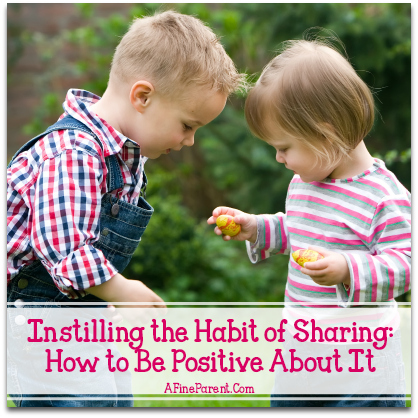 We all know the expression, “Sharing is caring.”
We all know the expression, “Sharing is caring.”
But sharing is also so much more than just caring, isn’t it?
Teaching our kids to share their toys, story books, or at times their favorite food, is another way to teach our kids how to be compassionate—not just towards other kids, but in general with people around them as they grow up.
Sharing is not always an easy habit to instill though.
If you are a parent with two or more kids, you’re likely more than sick of the constant sibling fights related to not wanting to share. Somehow, a toy never looks quite as appealing to a child as it does when her sibling is playing (peacefully!) with it.
And like me, if you are a parent of a single child, instilling the sharing habits takes on a completely different form. I have a 3.5-year-old son, and considering that he doesn’t need to share his toys with anyone during the course of regular play at home, I find it really hard to introduce the concept of sharing to him.
I’m an aspiring positive parent. As with other things I teach my child, I want to go about this as positively as I can. I have been trying a few things, and I’m happy to say that things are certainly looking up when my son has play dates with other kids.
#1 Don’t Force
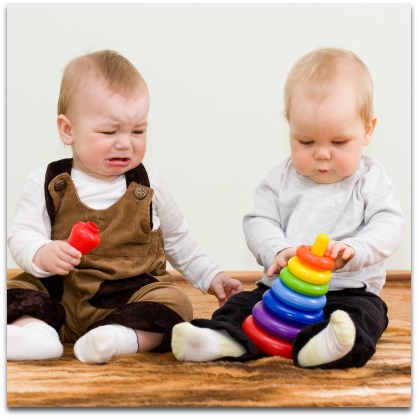 Never force your kids to start sharing their toys the moment their sibling or the neighbor’s kid wants what they are holding.
Never force your kids to start sharing their toys the moment their sibling or the neighbor’s kid wants what they are holding.
The idea is to first talk to your kid about what sharing is all about. Instead of yelling, “John, you need to learn to share your toys with Joe, or he will not play with you anymore”, be calm about it the first time and demonstrate what sharing is to them later in the day.
When my son had his first playdate at our place with his friend, a girl who is a year younger than him, he was all bossy and didn’t let her touch anything.
As a normal parent, seeing my son not sharing at all did concern me a lot. With great difficulty, I kept my calm at that instant. It is after his friend left with her mom I talked to my little ninja about what sharing is, by displaying a few examples of sharing with the help of my husband.
We both did some role-playing and were painting on different sheets. I had red color with me, and my husband had blue color, and when I wanted the blue color I very politely asked my husband, “Would you please share your blue color with me for 5 minutes?” To which my husband replied with a smile on his face, “Sure, you may have my blue color for your painting for some time”. And to this, I replied by saying, “Thank you so much, honey, for sharing your blue color with me,” keeping my toothy grin intact.
I don’t think that my son absorbed the concept of sharing that very same day, but he observed something, and the seed of sharing was sown inside his mind.
My husband and I like to have fun raising our little boy, so role-playing works for us.
If role-playing isn’t your cup of tea, though, you could as easily do this by asking your husband if he will share a piece of his dessert with you at the dinner table.
The idea is to introduce the concept of sharing gently to your kids, and by demonstrating it to them in some way, rather than by forcing them to do it while in the middle of play.
Think about it…
When you demonstrate what sharing is, you put it in a positive light, and all those smiles on your face link it with a positive connotation.
When you force them, you are starting off with a negative feeling about sharing in their minds. It can only be an uphill battle from there!
#2 Teach Them to Take Turns
Whenever my son and his friend go out with their respective scooters, my son wants to ride his friend’s scooter, as it is brand new and has some music coming out of it, while my son’s scooter is now an old one.
Luckily, I was not the only mom here! So, my son’s friend’s mom and I did some brainstorming, and we came up with this excellent idea that worked that day and still works with respect to many other toys.
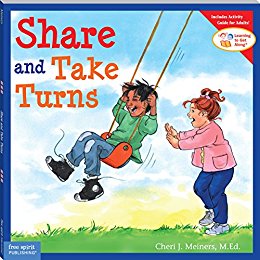 We made my son and his friend understand that it would be so much more fun if they took turns riding each other’s scooters instead of riding their own scooter all the time.
We made my son and his friend understand that it would be so much more fun if they took turns riding each other’s scooters instead of riding their own scooter all the time.
When I say ‘turns,’ I mean complete 2 rounds of the tennis court and then exchange.
Sharing does not always mean giving up on your toy completely for the rest of your playtime; it also means taking turns.
Share and take turns by Cheri J. Meiners is a beautifully illustrated book for reinforcing this idea in your kids.
#3 Understand Your Child’s Behavior before You Respond
My son, being a single child, has the monopoly over every toy he has. It’s the same with siblings—until the younger ones appear on the scene, the older ones have the run of the toy bin.
When that monopoly is threatened, they are bound to show all kinds of emotions. Suddenly, even the smallest of ponies, that they almost didn’t acknowledge the existence of, begin to look supremely precious when held in the hands of the friend/sibling. And they cry at the top of their lungs for their beloved, minuscule pony.
The goal here is for the parents to not get embarrassed by their child’s behavior. It is simply an outcome of the attachment to the things that your child thinks of as “mine” even if it they haven’t looked at it since after the day it was bought. It’s a fairly primal instinct to respond strongly to a fear that someone is encroaching on their comfort zone or territory.
As a sensible and positive parent, first calm down your child in the most compassionate way possible. Absolutely nothing substantial comes out of a loud and unsettling environment.
Then gently try to explain it to your child that “Joe really likes that pony and wants to play with it for some time. He will play with it only for a few minutes and will leave it here when he goes home. Why don’t you show him how cool your pony is, and then let him try it out for himself for a few minutes”.
You could also try saying, “Why don’t you let Joe play with it for a few minutes? In the meantime, we can find something else to play with and maybe Joe will join us too seeing how much fun we are having with these other toys?”
Now, this is one area where my son and I still struggle from time to time, but there have also been times when he has been easily distracted to engage himself with other toys.
This kind of situation is super tricky, but please do not be disappointed if it doesn’t work out the first time. Like most things with raising kids, it will take multiple attempts to get the message across. We just need to believe that our kids will eventually get there. Being disappointed at the first go would mean that we don’t have enough faith in our kids.
#4 Teach Your Kids How to Be Good Team Players
 It’s never too early to make your children understand the concept of being good team players.
It’s never too early to make your children understand the concept of being good team players.
So, engage your kids, and their friends in some team-building fun activities.
If you have multiple kids, you can have the kids in one team and parents in others. Since we have just one child, I do this with a friend and her son.
We go out and make 2 teams: we moms form one team, and our kids form another team. Team members must hold each other’s hand and run, while the other team chases them while also holding hands.
For our kids, this game was such a hit! They got to chase us, and we chased them. They have realized that it’s double the fun when they are together in a team. And, both of us moms make sure to convey this to them by telling them “how wonderful a team they both make”.
Together, everyone achieves more, and in our children’s case it is the fun they have, more and more along with little bit of learning.
There are a lot of other fun activities one can do with their kids without having parents involved. If there is a bigger group, let them play by themselves. The key is to steer them towards games that help build cooperation rather than result in competition and fights. Here is a list of 21 Fun Team Building Activities For Kids to give you some ideas.
#5 Let Kids Learn to Negotiate
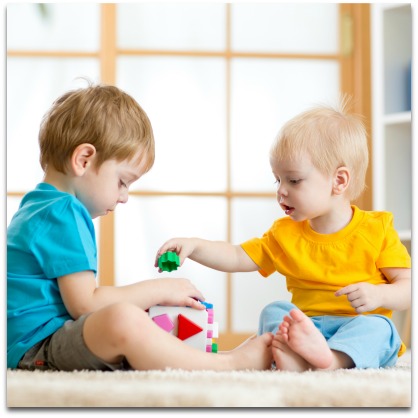 We may undermine our children’s intelligence thinking that they are too young. But this is almost never the case.
We may undermine our children’s intelligence thinking that they are too young. But this is almost never the case.
Kids are intelligent and can only really explore it when their parents are not around constantly monitoring them to make sure they are playing nicely.
I have done this with my son and his friends both at our place and at his friends’ place. I must say that most of the time, while we moms were busy chatting and enjoying our coffee, our kids were really taking turns in playing with the doctor set or taking turns to use the slide and negotiating the terms of their playtime.
They would sometimes come out and complain that their friends were not ready to share or take turns.
While the instinct is to jump in and help, my friends and I have made a pact to give our kids the first chance to resolve it themselves. When we do get involved, we facilitate finding solutions rather than solving it for them.
Coincidentally, this is what the experts suggest as the best approach for handling sibling rivalry as well.
#6 Absolutely NEVER PUNISH for Not Sharing
Let’s face it… Sometimes, we just don’t want to share. For instance, I am a mother and still, to this day, I do not like anyone working on my laptop for long.
Similarly, our children have that one special dinosaur or seal or shark that they would never want to share.
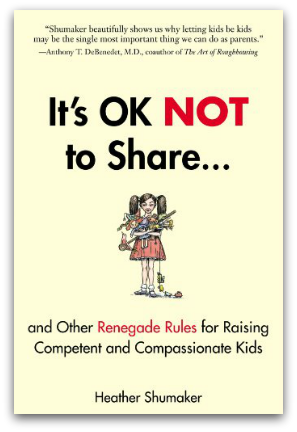 It’s OK. All of us have some prized possession that we don’t want to part with, and if your child doesn’t want to share that special toy with anyone, that doesn’t raise an alarm about his behavior and is not a cause to punish him.
It’s OK. All of us have some prized possession that we don’t want to part with, and if your child doesn’t want to share that special toy with anyone, that doesn’t raise an alarm about his behavior and is not a cause to punish him.
While trying to build up the foundation of sharing, or for that matter any habit, if we introduce punishment, we risk obtaining compliance without a clear understanding of why. The child may fear the negative consequences and may share next time, but it is not with an open heart; instead, it’s with the scared thought in mind that they will get punished if they don’t share.
That is certainly not what we are trying to achieve here!
#7 Make Sharing an Integral Part of Everyday Life
 Sharing is not something that should be restricted to just toys; it should be extended to other things as well.
Sharing is not something that should be restricted to just toys; it should be extended to other things as well.
Whenever we go out to Subway, my son would always get his favorite bag of chips and would never want to share it with us. So, my husband and I again set a visual example for our son to simply observe. We shared our sandwiches and appreciated each other’s sandwich.
No, he still doesn’t want to share his chips with us, but we continue with sharing our food so that he learns that sharing is not always associated with toys.
And I’m sure if I stay patient, one of these days, he will offer his chips to me open-heartedly without me having to force or blackmail him.
Alright then… those are the 7 ways to instill the virtue of sharing in our children that I have tried personally. Some have worked very well, while others are still work in progress. The whole idea is to stick to these simple methods, and sure enough, we have a more positive child today than he was yesterday.
And that’s more than what any mom can ask for, isn’t it?
 The 2-Minute Action Plan for Fine Parents
The 2-Minute Action Plan for Fine Parents
For our quick contemplation time today, here are few questions to answer:
- Does your child share easily?
- If the answer is “no,” how do you feel about that? Do you ever force your kids to share? What are some of the things you can do instead? (To make some real progress, think of a specific situation where your child did on share, and see which of the above ideas would have worked best for that particular situation.)
- If the answer is “yes,” how do you feel about that? Are you happy that he is compassionate and caring, and make sure to tell him about it? Or do you worry that he will be easily taken advantage of? How can you nurture your child’s kind heart while making him a strong person and teaching him to say no?
The Ongoing Action Plan for Fine Parents
- The ongoing activity would be to encourage our children by appreciating them every-time they show an act of sharing. Don’t just say, “Good job!” Instead, appreciate them wholeheartedly in full sentences like, “You did such a good job today by sharing your toys with your friend. Look how happy he was to play with you and how much fun you both had!”
- Keep jotting down which technique works best for your kid and work towards implementing that technique in your child’s day-to-day life.
- Enroll him in some team sport or any kind of sport. Coming from a sports background myself and after enrolling my son into a sport, I can vouch 100% that, be it a team sport or an individual sport, it does teach you a lot about teamwork in general and makes you a much more sharing person as you grow up.
- Arrange a trip to an orphanage to make our children understand that it is not only their friends with whom they can share their toys or books, etc., but also these other children who would be extremely happy to play with his/her old toys. Only when he/she happily agrees to share his old toys, books, or clothes then make another trip to share. This will teach him empathy toward the children who need our support and, eventually, empathy towards everyone in need as they grow up.

These are great suggestions, thank you! We talked about this in my other mommy community, the Weecare.co Community Page. A few things that work for us is positive reinforcement for sharing, trying to explain the other child’s feeling, and finally increased social interaction. Another mom said, “it was good to schedule a lot of playdates and then show him what happens when other kids had something he wanted to play with and what happens when the other child shares something he wants to play and how happy he was when it was shared with him.” If anyone is interested in the full thread, here’s the link: https://weecare.co/post/my-son-hates-sharing-how-can-i-teach-my-toddler-to-share-229.
A well written article with many good examples. I especially liked the Ongoing Action Plan. One of the things we did when our four were growing up and had out grown a piece of clothing or a beloved item (bicycle, scooter, etc.) we suggested they help wash it up, paint it (if necessary) and get it into “lovingly perfect” shape. Then they wrapped it as a gift to pass down to the next sibling as a birthday or Christmas gift (this could also fit sending items off to “Good Will” or a similar organization). This helped instill the act of sharing, helped ease the difficulty in giving something up they they loved and developed empathy for others. Today as adults they often demonstrate the same caring attitude towards others.
The main thing that I found helped my kids with sharing was saying, “Sharing means you get it back.” Sharing is not the same as giving something away, and clarifying that made a big difference. Handing over a toy with the idea in mind that they would get it back made it easy for them to share.
Great ideas and well explained. I have a diploma in child development, a bachelor in early childhood education, a degree in psychology/sociology, over 20 years of experience in working with children and a teenage child of my own.; I love Monalisa’s ideas and her approach to children.
Two thoughts I have along the same line:
1. I don’t take my child personally. They are a separate person. I don’t see her as
a reflection on me.
2. My job is to support her in her goals. We are human and are naturally see the
world through our own eyes. When working camps with welfare referred
children, I discovered the joy of seeing the world through their eyes. I suddenly
got an appreciation of sea shells and the wonder of nature. It is an adventure to
see things through someone else’s eyes. The greatest joy I got though, was
from seeing a child join in a caring partnership with an adult. This was
especially so for the camp kids because they had all been through major
traumas. I get a warm smile whenever I see an adult caringly engaged with a child.
This is like an answered prayer. My daughter is 4+ and until today she has been the best sharing toddler I have ever seen around my friends. She even shares her new toys on her birthday and a child who offers “her” chair to anyone while playing musical chairs! Today while on a play date not only she refused to share her swing with her favorite friend also she blankly asked her friend and my friend not to come again because she doesn’t want to share the swing. I’m still shocked with her response. This article was easing my mind…
Hi Ashani,first of all, thank you so much for reading this article. It is absolutely fine for a kid who used to be sharing and kind to not want to share anymore. It is shocking for us parents thinking what changed suddenly but give it time. There are a lot of factors that could trigger this behaviour. I am a Pre-school teacher and spend a lot of time with all kinds of children. Some would share, some don’t care if others are sharing with them or not and some would simply snatch without asking. Children who are naturally good at sharing when start going to pre-school mingle with all sorts of children. When they see other kids not sharing or snatching away things without asking, they discover something new and think of it as an easy way to keep their toys to themselves. So when they imitate the same behaviour at home, we wonder what happened to our sweet little child but in reality this is just a part of personality development. They do what they see. As parents all we need to do is demonstrate different sharing techniques without punishing them for their suddden change in behaviour. Pre-school example is just one of the factors. Sometimes a child really does not want to share which is again completely fine. Think of it this way, if 7 out of 10 times your child is sharing and being kind to his/her friends he/she will do more than fine. While we are trying to make our kids a better person, we should not forget about their instincts and personality. Toddlers and pre-schoolers are such smart kids than we give them credit for. If they observe and pick up something that we don’t like, give it time, work towards it and never ever punish your kid for not fulfilling our pre-conceived set of expectations or just because they are embarrassing us. Best mantra – stop feeling embarrassed if your child does not share. When we get embarrassed we start making it our own agenda. Instead we should focus on our child’s agenda, why what and how this change in behaviour got triggered and how to work patiently towards better sharing skills. I hope this further eases your mind.